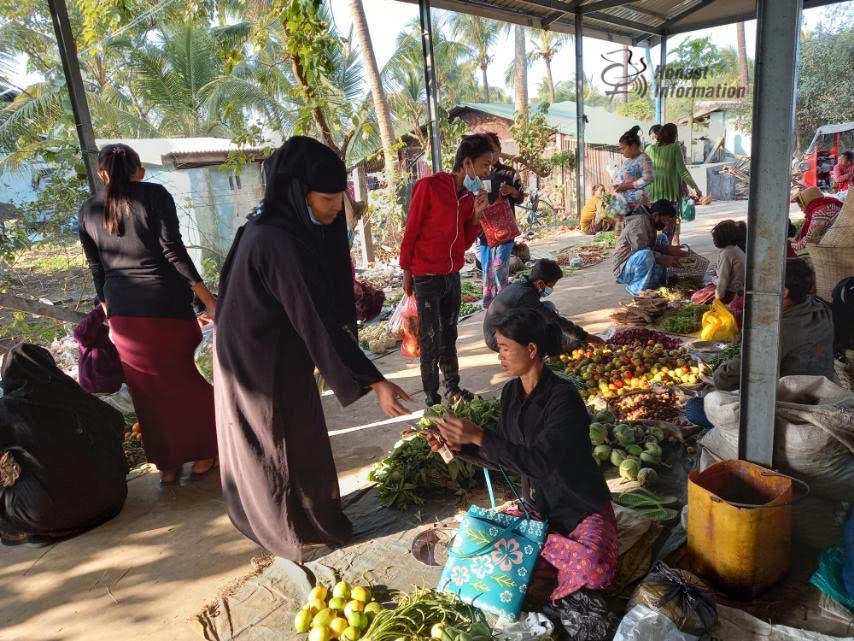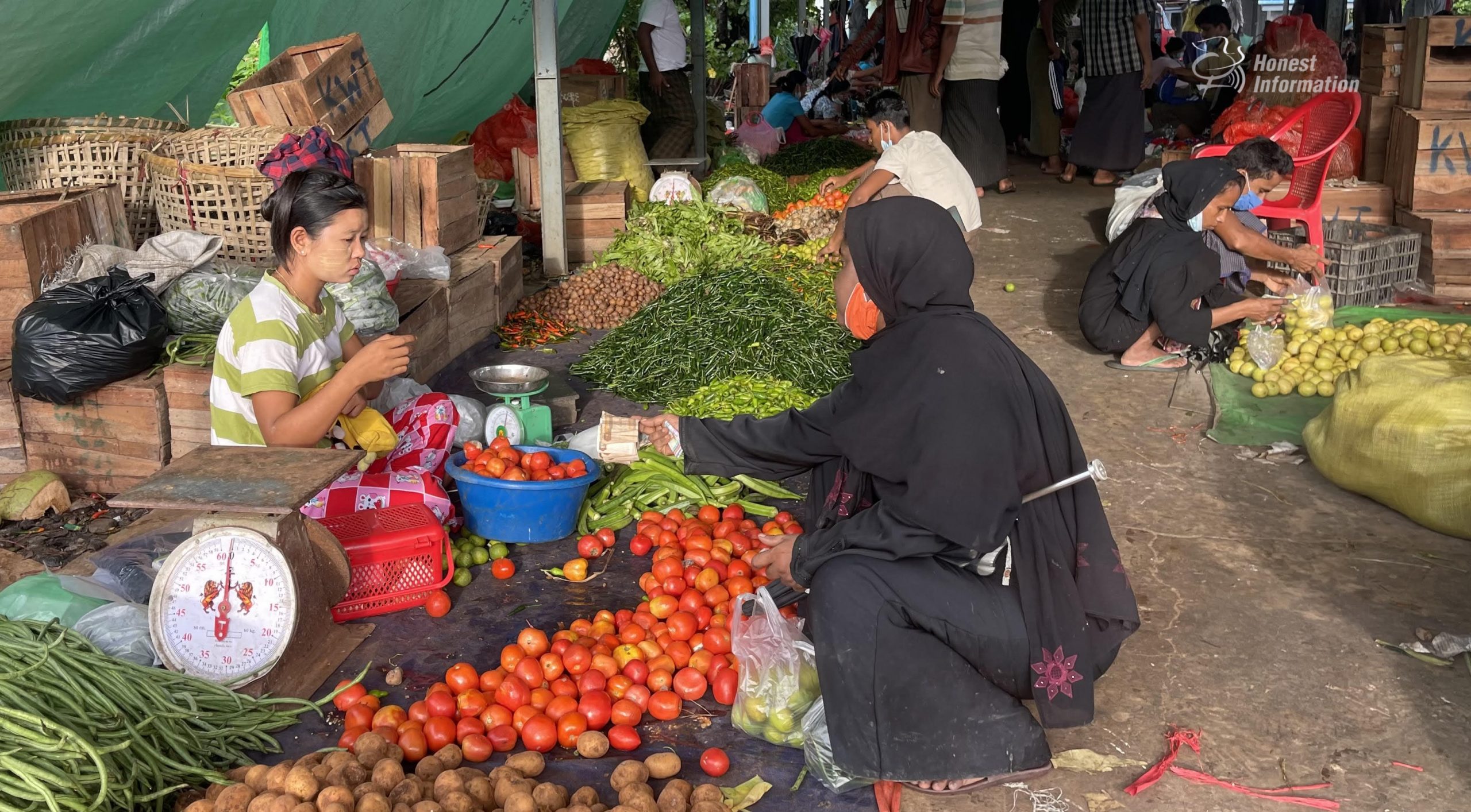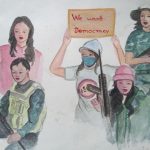Decade-long yearning
Thant Shin Tun
For a decade, Daw Thazin Tun’s clothing shop could not be sold well even getting 10,000 MMK per day after winning back its customers, it has regained momentum.
Daw Thazin Tun, aged 48, opened a clothing shop in Sittwe’s new Market in 2000 and her main customers are her classmates Rohingya women in her ward.
Her clothing shop has fewer buyers after the incident of widespread rioting and clashes between Rakhine Buddhists and Rohingya Muslims in 2012. People were afraid of going out in the city, so her shop was about to close, she said.
Daw Thazin Tun said how badly the business was in a decade, “Business is very bad and so I don’t want to sell the clothes and then I thought of closing the shop for good!”
However, since the end of 2021 in Sittwe, Rakhine State, the Rohingyas have been able to move freely anywhere without security concerns, and have managed to build trust between the Rakhine and Rohingya communities. That’s why she has got regular Rohingyas customers again like those days back in 2012 before the crisis broke up.
Because of better mutual understanding among those two communities in Sittwe, they are willing to live together peacefully and have no hostilities towards each other, so they can go anywhere freely.
One of Daw Thazin Tun’s customers was one of her best friends, a 48-year-old Rohingya woman, Daw Phyu Phyu San.
Daw Thazin Tun and Daw Phyu Phyu San were schoolmates who lived in Rupa Taung Ward, Sittwe. Due to the conflict in 2012, Daw Phyu Phyu San had to move from Rupa Taung Ward to the Tet Kal Pyin Refugee Camp. The two friends had lost contact since then.
In Rakhine, 50 Rakhine and Muslims were killed in a conflict between Rakhine and Rohingya over a rape that ignited in Kyauk Ni Maw Village, Rambre Township in 2012. As a consequence of the conflict, 54 people were injured, 2,230 houses and more than 600,000 people were left homeless.
After the crisis, the Rohingyas in Sittwe had to move to refugee camps arranged by the government and the rest of the Rohingyas who had not moved had to live with security guards.
Due to the mistrust on both sides, after the crisis erupted, the Rohingyas did not dare to go to the residential areas of Rakhine communities and likewise, the Rakhine did not dare to go to the Rohingyas’ quarters or villages, recounted Daw Phyu Phyu San.
When there was such mistrust between Rakhine and Rohingya, Daw Phyu Phyu San once riskily went to the clothing shop of her childhood friend Daw Thazin Tun in 2019.
“I tried various ways to go into the city and finally, I dressed like a Rakhine lady and I was able to make it,” she added.
When she arrived at Sittwe’s new market, she went straight to her best friend’s clothing shop.
“When she saw me, she looked at me with amazing eyes. I smiled at her back and went straight into her shop. At that moment, my friend hugged me and we both cried,” recounting how they are far away and it was hard to see each other even though they live in the same city.
Rohingya woman Daw Phyu Phyu San said that before the conflict in 2012 in Rakhine, the two communities-Rakhine and Rohingyas lived together in unity and all of her friends were Rakhine People.
She added,” We were very close and we discussed even personal matters.”

She continued that if there were community events in the ward such as ordination or funerals, both communities helped and there were no conflicts at the time.
At the time of conflicts flare-up, the Rakhine in her quarter protected them and other Rakhine friends living in other wards reached them to protect and so was the friendship between the two communities, she retold.
The mistrust between Rakhine and Rohingya communities has existed for a decade, yet the friendship which developed in the past has not died away and the mutual trust has been able to rebuild in both communities since the beginning of 2022.
In the past, the Rohingyas who used to work at the houses of the Rakhine people were able to work again freely without any hurdles.
Trader Ko Than Naing said, “Most of the basic workers are Rohingyas, so we had some difficulties when they were not here.”
Now that there is no conflict between the two communities- Rakhine and Rohingyas any longer- working with each other is convenient for the traders, sellers, and Rohingyas workers, he added.
Ma BiBi, a Rohingya woman who is living in Aung Mingalar Ward in Sittwe and employed in a Rakhine house in Ma-Gyi-Myaing Ward, noted “Working in a Rakhine house makes me feel safe mentally as well as physically and in addition, the family members of the Rakhine house she has worked are friendly toward her.”
Ma Bibi, aged 30, added,” We have been working in Rakhine houses since we were children.”
As Rakhine attitudes toward Rohingyas have changed, they can work in Rakhine houses and can go freely in the city and wards without any hindrances, said U Kaung San-shi, a 70-year-old former officer of the General Administration Department of Sittwe.
The clashes between the Rakhine and the Rohingya in Rakhine State were due to an organization and the religious ideologies of some extremists in both societies, and after the Maungdaw border conflicts in 2017, both sides had come to understand each other, U Kaung San-shi wound up.
Another point is that Twan Marat Naing, Commander-in-Chief of the Arakan Army (also known as Rakhine Army (AA) recognized the human rights and citizenship rights of the Rohingya under the direction of the Arakan Army in an interview on June 5, 2022, by PROTHOM ALO, a publication based in Dhaka, Bangladesh.
People have gained political awareness these days and civil society organizations have facilitated to be peaceful coexistence. In addition, the Arakan Army (AA) sometimes sends messages of peaceful coexistence to the community, said U Aung Kyaw Moe, an advisory member of the Ministry of Human Rights of the National Unity Government of Myanmar.
Ko Zaw Min Tun, leader of Rohingya students in Sittwe, said, “Those who attempted to restore the social harmony between Rakhine and Rohingyas are the efforts of young Rakhine and Rohingyas and those efforts played a vital role, too.”
The leader of the Rakhine Student Union, Ko Kyaw Naing Htay, said that only the Rakhine community could not go well in the present status and so, the public must be explained to understand that helping each other in diverse ethnics in Rakhine could go well in the future.
Currently, the issue of Rohingya students who had not been allowed to attend Sittwe University for a decade has been tackled to get the chance to join the university. Moreover, he added that the Rohingya youths have started practicing Buddhist Lent Robe’s offering.
The Advisory Commission on Rakhine State chaired by former UN Secretary-General Kofi Annan stated that as a consequence of the clashes in 2012, the linkage between Rakhine and Muslims (Rohingyas) had deteriorated.
That’s why the government has the responsibility to guarantee the State’s stability, and it is also advised that it should be carried out to have the necessary laws to take effective actions against the activities escalating hatred in Myanmar.
They clearly said that without learning and being aware of those kinds of suggestions and reporting things, however, Daw Phyu Phyu San and Daw Thazin Tun have grown trust between them, so they could live peacefully.
Daw Thazin Tun, the owner of the clothing shop, who was on the edge of shutting down her shop due to the lack of regular customers, is now grabbing her friend Daw Phyu Phyu San inside her shop to get more customers.
“If someone wants to buy some clothes in convenient conditions, please guided them to my shop,” Daw Thazin Tun told Daw Phyu Phyu San.
Thanks to her friend’s mention of the clothes shop, although most of the Rohingyas women in Sittwe have bought at her shop, the business is not so good because of the political instability as well as the economic downturn in the country.
Yet she added that she is so glad to have her customers back, most of them had not come to the shop in a decade as a consequence of insecurity and mistrust.
She has ensured that she could not stand the situation if someone or an organization breaks the current peaceful situation between the two communities.
Daw Phyu Phyu San said that if there is another clash popping up over an issue, Rakhine and Rohingya people will become brainless people who are not able to judge things carefully.
- ဇွန်လအတွင်း ဆယ်ကျော်သက်တွေအပါအဝင် အမျိုးသမီး ၃၄ဦး စစ်ကောင်စီကြောင့်သေဆုံး - 10/07/2025
- တပြိုင်တည်း တိုက်ပွဲနှစ်ရပ် ဆင်နွဲနေရတဲ့ အမျိုးသမီးများ - 09/07/2025
- ဒို့အတွေး ဒို့အမြင် - 08/07/2025





